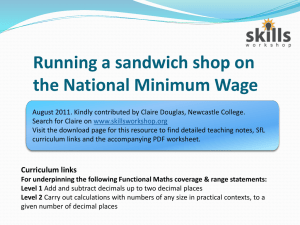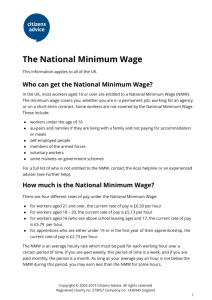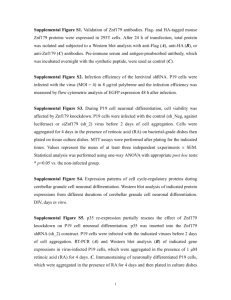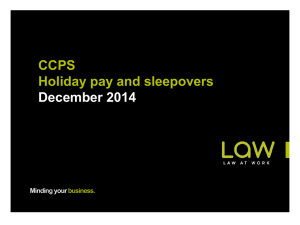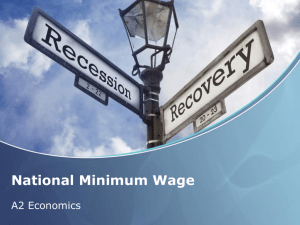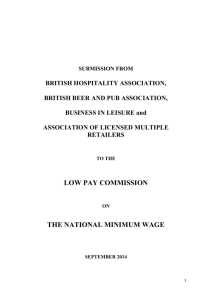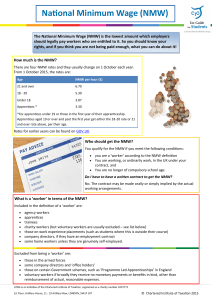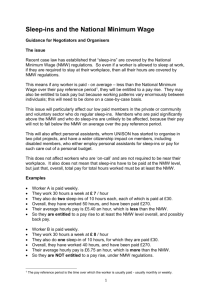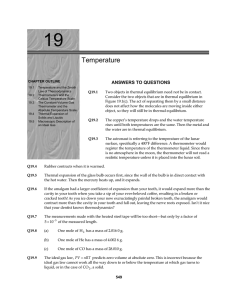14. National minimum wage_Feb16
advertisement
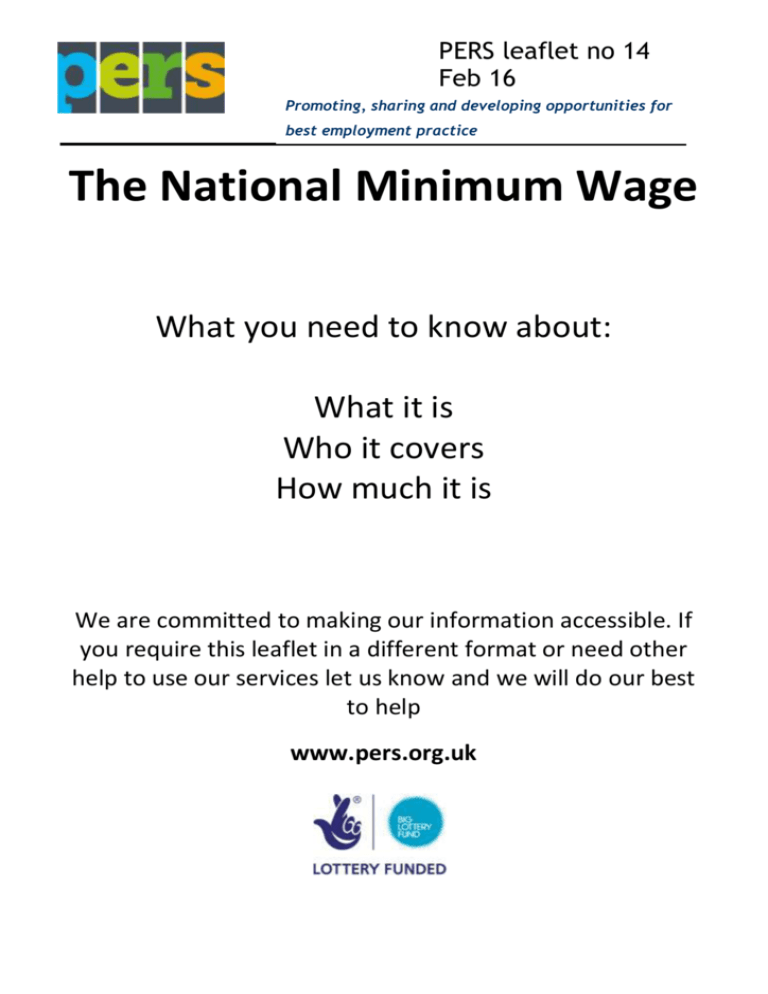
PERS leaflet no 14 Feb 16 Promoting, sharing and developing opportunities for best employment practice The National Minimum Wage What you need to know about: What it is Who it covers How much it is We are committed to making our information accessible. If you require this leaflet in a different format or need other help to use our services let us know and we will do our best to help www.pers.org.uk What is it? The National Minimum Wage (NMW) is a basic minimum hourly rate of pay to which most workers are entitled. The government sets the NMW after considering the advice of the Low Pay Commission, an independent body of representatives from workers’ and employers’ organisations and other experts. There are different NMW rates depending on age and whether a worker is being trained in a new job. See the end of this leaflet for the current rates. NB: from April 2016 a new mandatory National Living Wage (NLW) for workers aged 25 and above will come into effect. The NMW will continue to apply for those aged under 25 with a premium added on top for older workers taking their total hourly rate to the National Living Wage (NLW). See Page 7 for rates. Who is covered? Most workers aged 16 or over are covered by the NMW. This includes part time and casual workers as well as agency workers, home workers and people over retirement age. The rates are the same for all parts of the UK and for all kinds and sizes of firms. Apprenticeships There is also a minimum wage for apprentices. An apprenticeship should be clearly linked to an accredited programme of structured learning. The apprentice rate applies to apprentices under 19 and those aged 19 or over who are still in the first year of their apprenticeship. Apprentices aged 19 or over who have already completed a year of their Apprenticeship are entitled to be paid at least at the full NMW rate appropriate to their age. Apprentices are those on a contract of Apprenticeship or those on a Government funded Apprenticeship in England, Northern Ireland, Scotland or Wales. Internships There is often confusion about the position of ‘interns’ in relation to the NMW. There is no legal definition of an internship or of an intern. Essentially an intern is a person who works in a temporary position, with an emphasis on training rather than just employment. In some ways an intern is therefore like an apprentice. Some interns are paid, but a very substantial number are not. Whether an intern is a 'worker' does not depend on their job title or how they are described but on the nature of the contractual relationship. It does not matter if this contract is not in writing. In brief, if the internship is not primarily a work shadowing and training experience and the intern is expected to undertake work of value to the employer then it is likely that the intern should be paid at least the NMW appropriate to their age. Failure to pay the NMW to someone who is entitled to it is against the law. Who is not covered by the NMW? Those who work as self-employed, a volunteer, a prisoner, a share fisherman or work for the armed services or live and work as part of a religious community are not entitled to NMW. Those who are non-employed trainees on a government funded scheme, in a workplace as part of a sandwich course or on post-graduate work experience are also not entitled to NMW. Those who live and work as part of a family (for instance, as an 'au pair') are not entitled to the minimum wage. People doing household chores within their family or for friends and neighbours do not qualify either. Agricultural and Horticultural Workers The Agricultural Wages Boards (AWB) used to agree the pay rates and terms of work for most agricultural workers. These were generally better than the NMW. The Agricultural Wages Board in England was abolished on 1st October 2013. Agricultural workers who have a contract which commenced before this date should keep the terms and conditions set by the last AWB. Their employer should not make changes to their contract without their agreement. Those employed after 1st October 2013 may be offered different terms but these should not be less than the NMW and other legal minimum terms about holidays etc. and a written statement of employment particulars outlining terms and conditions should be provided within 2 months of starting work. For more information see PERS Leaflet 1 Contracts of Employment. Wages for workers in Scotland and Northern Ireland will continue to be set by their own Agricultural Wages Boards. The Agricultural Advisory Panel for Wales sets agricultural wages for Wales. What counts as wages? The basic wage must average out at an hourly rate which is no less than the legal minimum for eligible work done in working time (see below). The average should be worked out over a normal pay period (usually a week, a fortnight, 4 weeks or a month). The averaging out period must not be more than one calendar month. The calculation should be applied to the basic wage. This must include work done on piecework rates (see below for details). It can include incentive payments or performance bonuses. Things that should be excluded in calculating the pay rate are: shift premiums, allowances (such as unsocial hours, ‘on call’, attendance or responsibility allowances), most benefits in kind, redundancy and pension payments, court awards or settlements. Tips paid directly by customers to staff should not be used to make up the NMW and should be paid in addition to it. Where accommodation is provided as a benefit in kind, a maximum of £37.45 per week [from October 2015, up from £35.56] or £5.35 per day [from October 2015, up from £5.08] may be deducted from the calculation. This is known as the National Minimum Wage Accommodation Offset. It can be adjusted on an hourly or daily basis if the worker only lives in part-time. What is 'working time'? A worker should earn no less than the minimum rate for all hours when they are: required by the employer to be at the place of work (that is, not on a rest break or other time off, or laid off) at the place of work (or travelling on employer’s business, or on relevant training, including training offered as part of an apprenticeship) available for work (that is, not sick, on maternity, parental or dependants' leave, on unpaid holiday or on strike). Unless they are ‘laid off’ workers should still be paid at least the minimum rate if these conditions apply but no work is available (for instance, if machinery has broken down or there are no customers in the shop). If a worker is ‘laid off’ (that is, not required to be at work- usually because no work is available) for a complete day or more they may be entitled to guarantee pay. See PERS factsheet - Lay off, Guarantee Pay and Redundancy. Most people should also receive their normal pay, which must be at least the minimum rate, while they are on statutory annual holidays. Sleep in Shifts At present, if a worker is allowed to sleep on work premises and is provided with suitable sleeping facilities (not their place of residence) they should be entitled to the NMW irrespective of being awake or not. On the other hand, if they are on standby or on-call during time when they are at home, they do not have to be paid the NMW for that time. Calculating the rate of pay Most people can calculate whether they are getting the NMW by dividing their wage by the number of hours they work (time work). For example: A worker is paid £270 per week to work from 8.00am to 5.00pm for 5 days a week, with one hour (unpaid) for lunch. They work for 8 hours a day, 40 hours a week. The hourly pay is £270 divided by 40 hours. This is £6.75 an hour. Some people are paid by output rather than by time. Common examples of this are piecework, commission work and work done in the home (outwork or homework). In this case the employer should either pay the hourly rate at no less than the NMW for each hour that you work or the employer should apply the system of fair piece rates. This means that the employer will carry out tests to find the speed an ‘average’ worker would take to complete the work and then set a piece rate so that an ‘average’ worker can earn at least 120% of the NMW. What records must be kept by your employer? Most workers have a right to receive an itemised payslip each time they are paid. Employers must also keep records of pay and hours worked. If a worker has reason for suspecting that they are not being paid at or above the legal minimum, they have the right to ask the employer to let them see and copy the relevant pay records. If the employer does not produce the relevant information, the worker should call ACAS (03001231100) within 3 months of the refusal. The worker should write a grievance letter to the employer first. Enforcement NMW teams are part of Her Majesty’s Revenue and Customs. They have powers to inspect employers’ records, serve a notice of underpayment and to take them to court for non-payment of NMW. Workers who want to make a complaint about non-payment of the NMW should contact ACAS on 0300 123 1100 for advice. They will take details and advise on how to get the employer to try and sort out the situation. If the dispute is not settled the case will be followed up by regional compliance officers. They will visit the employer to check the records and ensure correct payment. Workers can also make a claim to an Employment Tribunal (ET) for unauthorised deductions (but they still need to contact ACAS first). An Employment Tribunal Claim can also be made if an employee is dismissed in order for the employer to avoid paying the NMW, or if an employee is dismissed or put at a disadvantage (a detriment) because they have asserted their rights under the NMW regulations. They will need to contact ACAS if they intend to do this, see PERS leaflet No 11 Dismissal. Alternatively they can use the County Court system to recover money which is owed to them. They are costs associated with making a claim through the ET or the County Court so potential claimants should seek advice before proceeding. National Minimum Wage Rates from 1st October 2015 (2014 -15 rates in brackets) Full adult rate (workers aged 21 and over): £6.70 an hour (from £6.50) Youth development rate (workers aged 18 – 20): £5.30 an hour (from £5.13) Young workers rate (for workers under 18 but above the compulsory school age who are not apprentices: £3.87 an hour (from £3.79) Apprentice rate (apprentices under 19, apprentices aged 19 and over in the first year of their apprenticeship): £3.30 an hour (from £2.73) NEW Adult Living Wage from April 16: Workers aged 25+: £7.20 per hour Further Information: ACAS (Advisory, Conciliation and Arbitration Service) www.acas.org.uk 0300 123 1100 The Government website has a tool to check whether you are getting NMW: www.gov.uk/am-i-getting-minimum-wage There is also a form which you can use to complain if you think you are not: www.gov.uk/government/publications/pay-and-work-rights-complaints-individuals PERS produce leaflets, factsheets and action packs about your rights at work. These are free to download and can be found in the publications section of our website at www.pers.org.uk We can also offer advice on a pay as you go basis currently £10 per 15 minutes on 01924 428030 Employment advice line 01924 428030 Monday and Friday 10am to 1pm Tuesday, Wednesday and Thursday 10am to 4pm Evening session Tuesday 5.30pm to 7.30pm Our service is currently free to some disabled people in Yorkshire and Humber. Reasonable rates apply for other workers, organisations and employers. Visit our website for details. www.pers.org.uk Pay & Employment Rights Service is a registered charity providing advice, information, training and consultancy on HR and Employment Law. We depend on grant funding and donations to enable us to offer our free services and publications. If you would like to donate, contact us or text PERS36 and the amount you wish to give to 70070. Thank you. The information in this leaflet was accurate at the time of going to press. It is intended as a guide and is not a full statement of the law. Seek advice before taking action. You can feedback about our service by clicking on the link on our website. © 2016 Pay & Employment Rights Service (Yorkshire) Ltd Company No 2201619 Registered charity 1097401 Suite 35 Batley Business Centre Technology Drive Batley WF17 6ER
